17个英语基本知识点
高考英语基本知识点
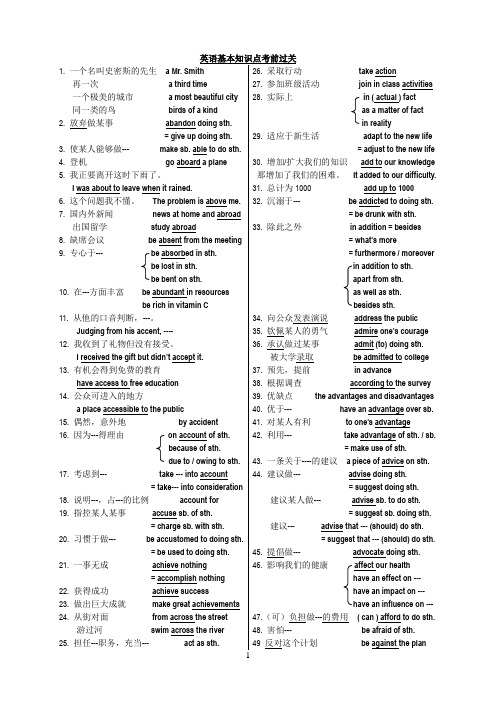
2.3.4.5.6.7.8.9.逆风 go against the wind 以蓝天为背景 against the blue sky 美元兑换率 rates against U.S. dollars 50. 看起来与年龄相符 look one’s age 51. 同龄 be of an age52. 在计划上达成共识 agree on the plan同意某人,与---一致 agree with sb. 一些人同意该计划。
Some people agree to the plan. Some people are for the plan.Some people are in favor of the plan.53. 达成协议 reach / come to an agreement 54. 远远超过--- get well ahead of --- 55. 向前,请吧,用吧。
Go ahead.56. 来帮助某人 come to one’s aid/ help 57. 该计划旨在帮助残疾人。
The project is aimed at helping the disabled. 58. 惊慌 get alarmed / panic 59. 被活捉 be caught alive 60. 首先,首要 above all / first of all毕竟,终究 after all 突然 all at once all of a sudden 全力以赴go all out 总的来说 all in all in a word in conclusion61. 允许做--- allow/ permit doing --- 允许某人做--- allow/permit sb. to do --- 62. 几乎没有什么 almost nothing 63. 不理会,更不用说做--- let alone (do) sth. 64. 别无选择除了做---have no alternative / choice but to do sth.65. 大量的水 a great amount of water 66. 使某人愉快的是, ---。
英语语音基本知识

英语语音基本常识一、英语语音基本常识1、音素。
音素是语言的最小单位。
英语中共有48个音素,英语的语音就是由这48个音素组成的。
音素有元音和辅音之分。
1)元音(20个):发音时声带振动,气流通过口腔时不受阻碍。
元音的分类:根据舌位的变化可分为:前元音、中元音和后元音。
根据口形变化情况可分为:单元音(12个,口形不变)和双元音(8个,口形变化)。
2)辅音(28个):气流通过口腔或鼻腔时受到阻碍,发音时声带不振动的是清辅音(11个),发音时声带振动的是浊辅音(17个)。
2、英语音素分类表元音单元音/i://Ⅰ//e//A//\://[//Q//B://D//R//J//u:/双元音/e I//[J//a I//aJ//R I//I[//e[//J[/辅音清辅音/p//t//k//f//s//W//F//tF//tr//ts//h/浊辅音/b//d//g//v//z//T//V//dV//dr//dz//r//l//m//n//N//w//j/3、音节1)音节是语音的最小片断,一个元音就可以构成一个音节,一个元音加一个或几个辅音也可以构成一个音节。
如,I/a I/,best/best/2)成节音:发音时比较响亮的辅音/l//m//n/又叫成节音。
3)成音节:在后面没有元音的情况下,成节音可以和前面的其它辅音构成音节,所构成的音节叫成音节。
如,lesson/5l esn/, table/5t e I b l/4)单音节:一个单词只含有一个音节的,称作单音节;双音节:一个单词含有两个音节的,称作双音节;多音节:一个单词含有三个或更多音节的,称作多音节。
5)单词重音/音节重读:在双音节或多音节的单词中,必有一个音节读得特别重,其余音节读得相对轻而弱,读得重的音节就是单词的重音/重读音节。
注音标时,会在重读音节左上方标上重音符号“′”。
4、开音节1)以发音的元音字母结尾的音节。
如,me,she.2)以一个元音字母+一个辅音字母(r除外)+不发音的e结尾的音节。
英语语法知识点汇总(收藏版)

英语语法知识点汇总(收藏版)1.一般现在时态(一)I、we、you、they作主语,动词原形后面跟;否定句,更容易,动词前面加don t;疑问句,别着急,句首Do,来帮你,后面问号别忘记,肯定回答用Yes,I、we、you、they加上do;否定回答要用No,I、we、you、they加don t.2.一般现在时态(二)主语三单他、她、它,动三形式后面压,词尾一般s加;辅音字母+y型,变y为i,es;ch,sh真有趣,s,x,es;三个特殊那里去?has、goes和does;否定句,记住它,动词前面doesn t;疑问句,别着急,句首Does,来帮你;肯定回答用Yes,he、she、it加does;否定回答要用No,he、she、it、doesn t;Does、doesn t来帮你,后面动词定注意,恢复原形要切记。
3.be 的用法口诀我用am,你用are,is连着他,她,它;单数名词用is,复数名词全用are;变疑问,往前提,句末问号莫丢弃;变否定,更容易,be后not莫忘记;疑问否定任你变,句首大写莫迟疑。
4.时间名词前所用介词的速记歌年月周前要用in,日子前面却不行;遇到几号要用on,上午下午又是in;要说某日上下午,用on换in才能行;午夜黄昏须用at,黎明用它也不错;at也用在明分前,说差可要用上to。
说过只可使用past,多说多练牢牢记,莫让岁月空蹉跎。
5.动名词在句中的功能及其他动名语法其功能,名词特征有动形,主宾表定都可作,动名现分要认清,现分不作宾和主,动名作状可不行二词皆可作定语,混为一谈不允许,主谓关系视分词,动名一词无此义。
现在分词(和过去分词)形式及在句子中的作用现在分词真好记,动词后面ING.它的作用真不小,可以充当定状表还有宾语补足语,忘记此项不可以6.分词作定语的位置及其他定分位置有二条,词前词后定分晓单个分词在词前,有时此规有颠倒分词短语在词后,定从和它互对照现分动作进行时,过分动作完成了(注:定分:做定语的分词:定从:定语从句:现分:现在分词:过分:过去分词) 7.可数名词的复数变化规律(一)名词复数有规律,一般词尾加s;辅音字母+y型,变y为i,es;ch,sh真有趣,s,x,es;f,fe真小气,字母v来把它替,es在后别忘记;字母o来真神奇,有生命来es,没有生命+s。
初中英语必背80个知识点

初中英语必背80个知识点1.much,a little, even, still等表示程度的副词可用来修饰比较级;而very, too, so, quite(表示身体健康的quiter除外)习惯上不用来修饰比较级。
2.arrive in +大地点/ arrive at +小地点= get to … = reach +…3.Let’s +动词原形4.长,宽,高的表达法:数字+量词+形容词。
如:20 metres wide二十米宽5.stop doing sth 停止正在做的事情6.stop to do sth 停下(正在做的事情)来做另一件事7.stop sb from doing sth 阻止某人干某事8.can’t stop doing sth 情不自禁干某事9.There is +单数可数名词/不可数名词+ 地点状语.10.How many+复数名词+are there+介词短语?11.remember to do sth 记得将要干某事(事没做)12.remember doing sth .记得曾经做过某事(事已做)13.在季节、月份、星期、节日、球类运动、棋类游戏的名词之前不用冠词。
14.would like to do sth 想要做某事15.How about /What about doing sth ?= Why not do sth ?询问意见/建议16.It’s time for sth 该到某事的时间了17.It’s time to do sth该到干某事的时间了18.have fun doing sth 很高兴干某事19.make sb do sth 使某人干某事20.can’t afford to do sth 没有足够多钱干某事21.can’t stand doing sth 不能忍受干某事22.mind doing sth 介意干某事23.try to do sth 尽力干某事24.finish doing sth 结束干某事25.decide to do sth 决定干某事26.plan to do sth 计划干某事27.It +takes +sb.+时间+to do sth28.sb. +spend +时间+on sth (in doing sth )29.Can you do sth ?你可以做,,,吗30.be busy doing sth 忙于干某事31.called = named = with the name (of)32.at the age of = when sb was/ were ….33.because of 后面接名词、代词、名词性短语、what从句34.keep doing sth . 表示不间断地持续做某事或一直做某事。
中考英语基础知识点
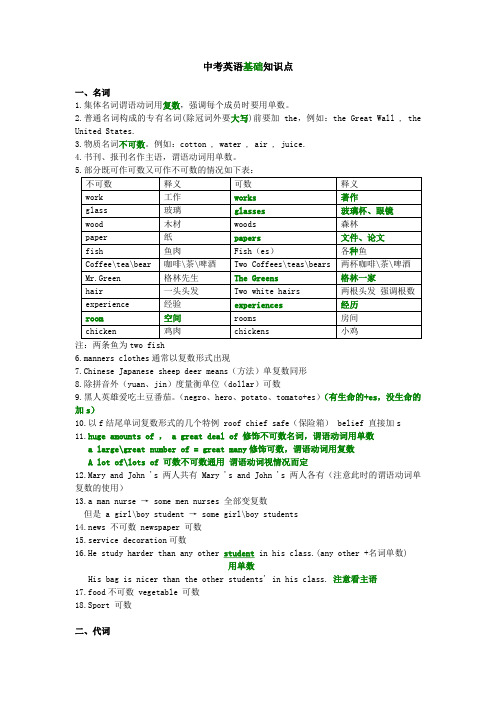
中考英语基础知识点一、名词1.集体名词谓语动词用复数,强调每个成员时要用单数。
2.普通名词构成的专有名词(除冠词外要大写)前要加the,例如:the Great Wall , the United States.3.物质名词不可数。
例如:cotton , water , air , juice.4.书刊、报刊名作主语,谓语动词用单数。
5.部分既可作可数又可作不可数的情况如下表:注:两条鱼为two fish6.manners clothes通常以复数形式出现7.Chinese Japanese sheep deer means(方法)单复数同形8.除拼音外(yuan、jin)度量衡单位(dollar)可数9.黑人英雄爱吃土豆番茄。
(negro、hero、potato、tomato+es)(有生命的+es,没生命的加s)10.以f结尾单词复数形式的几个特例 roof chief safe(保险箱) belief 直接加s11.huge amounts of , a great deal of 修饰不可数名词,谓语动词用单数a large\great number of = great many修饰可数,谓语动词用复数A lot of\lots of 可数不可数通用谓语动词视情况而定12.Mary and John 's 两人共有 Mary 's and John 's 两人各有(注意此时的谓语动词单复数的使用)13.a man nurse → some men nurses 全部变复数但是 a girl\boy student → some girl\boy students14.news 不可数 newspaper 可数15.service decoration可数16.He study harder than any other student in his class.(any other +名词单数)用单数His bag is nicer than the other students' in his class. 注意看主语17.food不可数 vegetable 可数18.Sport 可数二、代词1.one 表示不特指2.a car of one's own3.just\only\quiet\still a little\fewso\very little\few4.any\any one\none 可以和of连用anybody\anyone\no one\no body 不可以5.both 放在句首;在句中时放在Be动词的后面动词的前面6.Each flower is beautiful.Each of the boys are happy.They each are happy.7.the others = the other students8.不定代词作主语谓语动词用单数。
高二英语会考知识点归纳
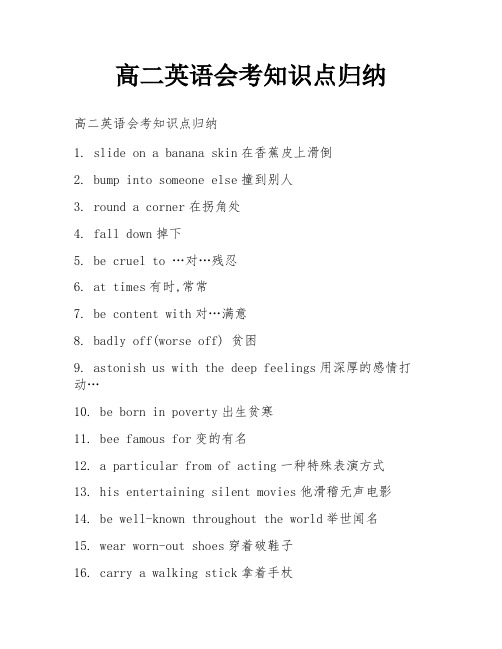
高二英语会考知识点归纳高二英语会考知识点归纳1. slide on a banana skin在香蕉皮上滑倒2. bump into someone else撞到别人3. round a corner在拐角处4. fall down掉下5. be cruel to …对…残忍6. at times有时,常常7. be content with对…满意8. badly off(worse off) 贫困9. astonish us with the deep feelings用深厚的感情打动…10. be born in poverty出生贫寒11. bee famous for变的有名12. a particular from of acting一种特殊表演方式13. his entertaining silent movies他滑稽无声电影14. be well-known throughout the world举世闻名15. wear worn-out shoes穿着破鞋子16. carry a walking stick拿着手杖17. a social failure一个社会生活中的失败分子18. overe difficulties克服困难19. be unkind to sb对…不好20. a boiled shoe煮熟的鞋子21. the problem facing sb面对某人的问题22. thousands of成千上万23. rush there in search of冲向…寻找…24. fortunate enough足够幸运25. pick up拾起…/接某人26. be caught in a snowstorm遭遇到暴风雪be caught on被…钩住27. on the edge of a mountain在大山边缘28. pick out挑出29. cut off切断,隔绝…30. as if似乎,好象31. eat every mouthful with great enjoyment每口都吃得津津有味32. star in主演…33. his lifetime outstanding work他终生杰出的工作34. be buried in被埋葬在…35. knock into撞到…36. think it funny to…觉得滑稽…37. play on words说俏皮话38. treat it as a question把…当作一个问题39. an answer to the question问题的答案40. go camping去露营41. in a mountainous area在山区42. in the open air在户外43. look up at the stars抬头看着星星44. how vast the sky is 天空多么广阔45. try a third time又试了一次46. pay special attention to特别注意…47. bring out the humorous meaning指出/阐明幽默的意思48. turn into变成…49. improve your English vocabulary扩大英语词汇量50. a sense of success成功感,成就感高二英语会考知识点回答反义疑问句时,若事实是肯定的,用yes回答;若事实是否定的,就用no来回答。
高中英语100条必考知识点
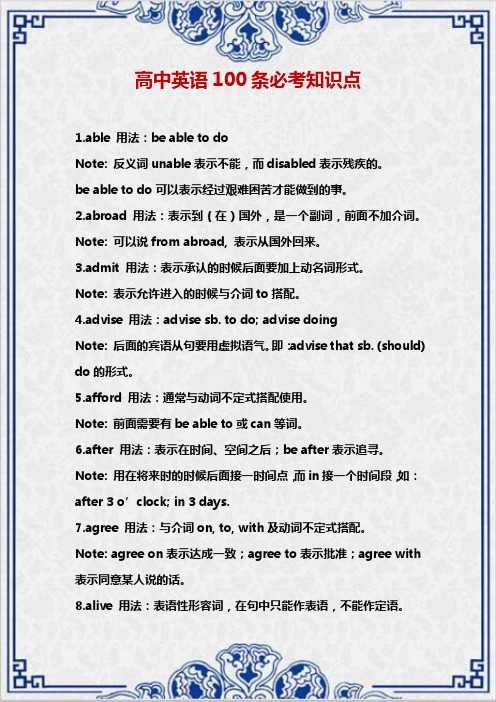
高中英语100条必考知识点1.able 用法:be able to doNote: 反义词unable表示不能,而disabled表示残疾的。
be able to do可以表示经过艰难困苦才能做到的事。
2.abroad 用法:表示到(在)国外,是一个副词,前面不加介词。
Note: 可以说from abroad, 表示从国外回来。
3.admit 用法:表示承认的时候后面要加上动名词形式。
Note: 表示允许进入的时候与介词to搭配。
4.advise 用法:advise sb. to do; advise doingNote: 后面的宾语从句要用虚拟语气。
即:advise that sb. (should) do的形式。
5.afford 用法:通常与动词不定式搭配使用。
Note: 前面需要有be able to或can等词。
6.after 用法:表示在时间、空间之后;be after表示追寻。
Note: 用在将来时的时候后面接一时间点,而in接一个时间段,如:after 3 o’clock; in 3 days.7.agree 用法:与介词on, to, with及动词不定式搭配。
Note: agree on表示达成一致;agree to表示批准;agree with 表示同意某人说的话。
8.alive 用法:表语性形容词,在句中只能作表语,不能作定语。
Note: 可以作状语使用,表示活活地,如:bury sb. alive.9.allow 用法:allow doing; allow sb. to doNote: 可以表示允许进入,如:Please allow me in.10.among 用法:用在三者或三者以上的群体中。
Note: 还可以表示其中之一,如:He is among the best.11.and 用法:用于连接两个词、短语、句子或其他相同结构。
Note: 与祈使句搭配时往往可以表示条件。
英语必背知识点公式总结

英语必背知识点公式总结1. Present Simple Tense:- Form: S + V1 (s/es) + O- Use: Use for daily actions, habits, general truths, and schedules.2. Present Continuous Tense:- Form: S + am/is/are + V-ing + O- Use: Use for actions happening at the moment of speaking, temporary actions, and future plans.3. Present Perfect Tense:- Form: S + have/has + V3 + O- Use: Use for actions that began in the past and continue to the present, past actions with an effect on the present, and experiences.4. Present Perfect Continuous Tense:- Form: S + have/has + been + V-ing + O- Use: Use for actions that began in the past and continue to the present with emphasis on the duration of the action.5. Past Simple Tense:- Form: S + V2 + O- Use: Use for actions that happened in the past, completed actions, and past habits.6. Past Continuous Tense:- Form: S + was/were + V-ing + O- Use: Use for actions happening for a period of time in the past and interrupted actions. 7. Past Perfect Tense:- Form: S + had + V3 + O- Use: Use for actions in the past that happened before another action in the past.8. Past Perfect Continuous Tense:- Form: S + had + been + V-ing + O- Use: Use for actions that had been going on before a certain past time or event.9. Future Simple Tense:- Form: S + will/shall + V1 + O- Use: Use for actions that will happen in the future, predictions, promises, and offers. 10. Future Continuous Tense:- Form: S + will/shall + be + V-ing + O- Use: Use for actions that will be happening at a certain time in the future or as predictions about the future.11. Future Perfect Tense:- Form: S + will/shall + have + V3 + O- Use: Use for actions that will be completed before a certain time in the future.12. Future Perfect Continuous Tense:- Form: S + will/shall + have + been + V-ing + O- Use: Use for actions that will have been happening for a period of time before a certain time in the future.13. Zero Conditional:- Form: If + present simple, present simple- Use: Use for general truths, scientific facts, and things that are always true.14. First Conditional:- Form: If + present simple, will + base form- Use: Use for real possibility in the future, specific plans or intentions, and offers or suggestions.15. Second Conditional:- Form: If + past simple, would/could/might + base form- Use: Use for unreal or unlikely situations in the present or future, hypothetical or imaginary situations, and polite requests or advice.16. Third Conditional:- Form: If + past perfect, would/could/might + have + past participle- Use: Use for unreal or hypothetical situations in the past, regrets or past events that didn't happen.17. Passive Voice:- Form: Object + be (am/is/are/was/were) + past participle (by + subject)- Use: Use for emphasizing the action or the result, when the doer of the action is unknown, or to avoid responsibility.18. Reported Speech:- Form: Reporting verb + (that) + subject + verb (tense and pronouns change)- Use: Use for reporting what someone else said without quoting them directly, often used in news, stories, and conversations.19. Modals:- Form: Modal verb + base form- Use: Modals are used to express necessity, possibility, permission, ability, advice, prediction, and requests.20. Articles:- Use: "A" and "an" are indefinite articles used with singular countable nouns, while "the" is the definite article used with all types of nouns to refer to something specific.21. Gerunds and Infinitives:- Use: Gerunds (-ing form of the verb) and infinitives (to + base form) can be used as subjects, objects, or complements of a sentence, but their usage depends on the main verb and the meaning of the sentence.22. Conditionals:- Use: Conditionals are used to express a condition and the resulting action or situation, with four main types: zero, first, second, and third conditionals.23. Comparative and Superlative Adjectives and Adverbs:- Use: Comparative forms are used to compare two things, while superlative forms are used to compare three or more things, with the addition of "than" in comparative and "the" in superlative form.24. Tenses and Time Expressions:- Use: Different tenses can be used to describe different time periods, and time expressions are used to indicate when an action or event happened, will happen, or is happening.25. Reported Speech:- Use: Reported speech is used to report what someone else said without quoting them directly, often used in news, stories, and conversations.These are some of the key English grammar formulas and knowledge points to remember. By mastering these, one can effectively communicate in English and understand the nuances of the language.。
英语知识点背诵
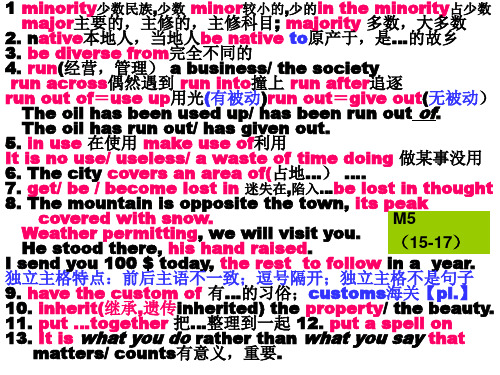
1. assistance n. 帮助 assist v. assistant助手 2. So precious is the time that we must cherish珍惜 it. 3. of vital importance至关重要的 4. It is estimated that..据估计 5. length n. 长 lengthen vt. 加长 6. request 要求 7. marvelous极好的 8. imperial皇帝的 9. tangible有形的 intangible无形的 10. monument纪念碑 11. inhabitant居民 inhabit v. :居住 12. bid/ bade/ bidden (bid/ bid /bid) 竞标 for sth. 13. enlarge增大 go through经历,法律等获准,通过 14. make the discrimination歧视 against sth. 15. advocate主张,拥护 16. legal status法律地位 17. Compromise折中,妥协 18. remind sb. of sth./ remind sb. that… 使某人想起 19. symbolic ambassador形象大使 20. at the mercy of受…支配; under the guidance指导 of 21. undertake/ undertook/ undertaken承诺,同意做某事 22. absent-minded心不在焉 absence缺乏,没有 23. subjective主观的 objective客观的 neutral中立的 24. a thorough understanding of sth.全面的了解 25. in return作为回报; in turn反过来说 27. ignore=overlook=neglect忽视 be honoured for因…而受尊敬; establish a fund建立基金 No one knows for certain./for sure. 没人确切知道
英语知识点清单

Unit 81.What’s up?=What happened to you?=What’s wrong/the matter/the trouble with you? 怎么了?2.be supposed to do= should do=ought to do 应该做…3.make sense 有道理有意义make sense of…理解make no sense 毫无意义4.find/ keep/make/think sb/sth +adj. 发现/ 保持/使得/认为某人某物…5.one and a half hours= one hour and a half 一个半小时6.play for 为…效力play against 和…比赛play with 和…玩,玩…7.continue doing sth. 继续做同一件事continue to do sth 继续做另一件事8.make mistakes in…在某方面犯错误9.be hard on 对…苛刻10. in this way 用这种方式in one’s own way 用某人自己的方法on one’s way to 在去…的路上by the way 顺便说一下11. be weak in (doing) sth 在某方面薄弱be good at (doing) sth 在某方面擅长12. dream of doing 梦想做某事13. teach oneself= learn sth by oneself 自学14. believe in=trust 信任15. feel like doing = would like to do 想要做某事16. fail in (doing) sth= fail to do 做某事不成功17. give up (doing) sth 放弃(做)某事17. notice/watch/see/hear/feel sb do/doing sth 看/听/感觉某人做某事/正做某事18. present sb sth=present sth to sb 介绍/展示给某人某物at present 现在目前19. It’s time for sb. to do sth. 到某人做某事的时间20. be nervous about 因…紧张21. be confident of… /have confidence in 在…自信22. go to college/university 去上大学Unit 71. in one’s free/spare time 在某人空闲时间2. take up (doing) sth 从事(做)某事,占据3. not only…but also…不仅...而且… (就近原则) both… and…两个都;既...又... (谓语复数)4. trade sth. with sb. 和某人交换某物trade A for B 用A交换B5. all kinds of 各种各样different kinds of 不同种类的k ind of = a little 一点6. add … to.. 增加…add up to 总计7. make up one’s mind to do sth 下定决心做某事make it 成功,做到make up 编造,弥补make fun of 取笑make a living 谋生make a decision 做决定8. thank sb. for (doing) sth 因为(做)某事感谢某人9. no more= not…any more 不再10. make/let/have sb.(not) do sth. 使得/让某人(不)做某事ask/tell sb (not) to do sth. 要求/告诉某人(不)做某事11. be proud of = take pride in 为…骄傲12. do with= deal with 处理相处13. be made of…由…制成(看得出原材料)be make from…由…制成(看不出原材料)be made up of…由…组成be made in…生产于某地14. take/ have a break 短暂休息15. common sense 常识16. send back 寄回send for 派人去请send sb. sth= send sth to sb. 寄送某物给某人17. so +be/助/情+主语…也是so +主语+ be/助/情…的确是Unit 61.It took sb. some time to do sth = sb. spent some time (in) doing sth/ on sth 花某人时间做某事sb. spent some money on sth= sb. paid some money for sth.= sth. cost sb.some money 花钱在某物上2. work on 致力于work out 解决,计算出来work for 为…工作3. a way to do /of doing 做…的方法 a way to learn English/ of leaning English 一种学习英语的方法4. put …together 把…放一起get together 聚会together with 和…5. be born 出生6. all over the world=around the world7. at a speed of …以…的速度travel at the speed of light 以光速行驶8. seem to do sth 似乎做某事9. at the beginning of / at the end of 在…的开始、结束10. be able to do sth. 能做…11. imagine doing sth. 想象做某事12. protect the environment 保护环境13. think of= come up with 相出think about 考虑think over 仔细考虑(代中原则)14. stay up late 熬夜晚15. allow sb. to do sth. 允许某人做某事16. all the time 一直17. ask sb. (not) to do sth. 要求某人(不)做某事19. from now on = in future 从现在开始20. more than=over 超过Unit 51. I have no idea.= I don’t know. 我不知道2. be good at=do well in 擅长3. be nice/kind/friendly to sb. 对某人善良/友好4. give a good talk to sb. 给某人做精彩报告5. be sure to do sth/of doing sth.. 确定做某事6. take steps to do sth. 采取措施做某事6. have a fear of = be afraid of 害怕… a fear of heights 恐高7. have experience in sth/doing sth 在某方面有经验8. stop sb. from doing = keep/prevent sb. from doing 阻止某人做9. overcome the difficulty 克服困难10. advise sb. to do sth. 建议某人做某事 a piece of advice 一条建议11. no matter what= whatever 无论什么12. a number of = a lot of 大量the number of ,…的数量13. run a business 经商14. be strict with sb. 对某人严厉be strict in sth. 对某事严格15. realize one’s goal 实现某人的目标16. and so on 等等17. ask sb. for help/advice 向某人寻求帮助/建议Unit 41.either…or…或者…或者… neither…nor …既不…也不(两个短语均适用就近原则)2.practice doing sth. 练习做某事Practice makes perfect. 熟能生巧3.No+ n/doing = Don’t +v. 禁止做4. point to 指向远处point at 指向近处或人point out 指出5. go/ walk by/past = pass 路过6. say to oneself 自言自语7. prefer A to B 比起B更喜欢A prefer doing A to doing B 比起做B更喜欢做Aprefer to do A rather than do B = would rather do A than do B 宁愿做A不愿做B8. lose one’s way= be/get lost 迷路be lost in 沉迷于9. the whole+ n. = all the n. 整个,全部…10. be busy doing 忙于做某事be busy with 忙于某事11. there be … doing…有…正在做…12. have the flu 患流感have a cold/fever/cough 患感冒/发烧/咳嗽13. have/has to do 不得不做…14. get to know 逐渐了解15. at the doctor’s 在医生办公室16. across from= on the opposite of …在…对面Unit 31. fall off= fall down from 从…摔下来2. an eight-year-old boy 一个八岁男孩3. too..to…太…而不能= not …enough to do …= … so that …can’t …4. blow out 吹灭5. have fun doing 做…玩的愉快It’s fun to do sth 做…是有乐趣的6. such as n/ doing sth 例如…/做…7. stay/keep in touch with sb. 与某人保持联系8. What can I do for you?= Is there anything I can do for you?= May/Can I help you?9. the same+ n. + as as+ adj./adv. (原级)+as 和…一样10. try on 试穿(代中原则)11. fit sb. well 对某人合身12. in fashion 时髦out of fashion 过时13. thanks to 多亏= because of = with the help of 14. as usual 像往常一样15. have a conversation with sb. 与某人谈话16. feel at home 感觉宾至如归17. best wishes to sb. 给某人最好的祝福18. on the top of 在…顶部19. turn off 关掉(代中原则)turn on 打开turn up 调高turn down 调低20. take a deep breath 深呼吸hold one’s breath 屏住呼吸out of breath 上气不接下气Unit 1-21. hope/ wish to do 希望做某事wish sb. to do sth. 希望某人做某事2. be late to do sth/ for sth. 迟于做某事/迟到3. teach sb. sth 教某人某事teach sb. to do sth. 教某人做某事4. except for 美中不足,除了5. one of + 形容词最高级+ 名词复数最…中的一个6. seem + adj./ to do sth. 似乎/好像…/做某事7. be convenient for 对…方便8. be surprised at sth/ to do sth. 惊讶于某事/做某事9. so + adj. +a/an+ n. = such + a/an + adj.+ n. 如此一个…10. at last= in the end= finally 最终,最后11. have a good discussion 进行一场深入的讨论discuss with sb.和某人讨论12. a friend of mine 我的一个朋友13. How do you like…?=What do you think of…? 你认为…怎么样?14. have trouble (in) doing sth. 做某事有麻烦15. agree with sb. 同意某人agree to do sth. 同意做某事agree on 就…达成一致16. hate to do/doing sth. 讨厌做某事dislike doing sth. 不喜欢做某事17. argue with sb. 与某人争论17. 数词+more+名词= another+数词+名词再多/另外几个…18. to one’s surprise 另某人惊讶的是19. be patient with 对…耐心的20. be married to sb. = marry sb. 和…结婚21. have the pleasure of doing 做…愉快。
英语高一知识点总结

英语高一知识点1fur与leatherfur指皮毛,尤指带毛的皮革制品,leather指皮革制品。
endanger v. 威胁die of与die from都译为“死于…”,当“死于疾病”时可以互换,但die of更强调由于年龄,寒冷,饥饿,情感等死亡,die from强调由于环境,伤害,事故等死亡。
如:The old lady died of old age.Careless drivers often die from traffic accidents.lead v. 领导leader与leadershipleader指领导人,领袖或带头的人,而leadership指领导,领导权等。
如:Our leaders are very considerate.Under his leadership, the company went out of depression.tour v. 旅行 n. 旅行species (pl.)n. 生物,物种measure v. 测量 n. 尺寸take measures to do sth.habitat n. 栖息地inhabit v. 居住在inhabitant n. 居民reside v. 居住resident n. 居民adapt v. 适应,符合adapt toadopt v. 收养,采纳original a. 原始的,起初的devote v. 奉献devote oneself to sth. /doingbe devoted to sth. /doingat present,for the moment,for the time being与now前三个词组译为“目前”,而now译为“现在”,前面三个是与将来相对而言的,而now是与过去相对而言的。
如:I don’t have money at present/for the moment/for the time being, besides which I must borrow more from you.We can’t discuss it at present . We can leave it to be discussed sometime next week.common a. 普通的in commonset sb. freevaluable a. 贵重的respond v. 回答,作出反应respond to sb.response n. 回答,答复,反应,反响in response toamount n. 数量harmful a. 有害的harm n. 害处 v. 伤害topic与titletopic指谈论,谈及的“话题”,title指文章的题目。
初一英语必考知识点

初一英语必考知识点学业的精深造诣来源于勤奋好学,只有好学者,才能在无边的知识海洋里猎取到真智才学,只有真正勤奋的人才能克服困难,持之以恒,不断开拓知识的领域,武装自己的头脑,成为自己的主宰,让我们勤奋学习,持之以恒,成就自己的人生,让自己的青春写满无悔!小编搜集的《初一英语必考知识点》,希望对同学们有帮助。
Unit 1 Can you play the guitar?◆短语归纳1. play chess 下国际象棋2. play the guitar 弹吉他3. speak English 说英语4. English club 英语俱乐部5. talk to 跟…说6. play the violin 拉小提琴7. play the piano 弹钢琴8. play the drums 敲鼓9. make friends 结交朋友10. do kung fu 练 (中国) 功夫11. tell stories 讲故事12. play games 做游戏13. on the weekend/on weekends 在周末◆用法集萃1. play +棋类/球类下……棋,打……球2. play the +西洋乐器弹/拉……乐器3. be good at doing sth.= do well in doing sth. 擅长做某事4. be good with sb. 和某人相处地好5. need sb. to do sth. 需要某人做某事6. can + 动词原形能/会做某事7. a little + 不可数名词一点儿……8. join the …club 加入…俱乐部9. like to do sth. =love to do sth. 喜欢/喜爱做某事◆典句必背1. Can you draw? Yes, I can. / No, I can’t.2. What club do you want to join? I want to join the chess club.3. You can join the English club.4. Sounds good./That sounds good.5. I can speak English and I can also play soccer.6. Please call Mrs. Miller at 555-3721.Unit 2 What time do you go to school?◆短语归纳1. what time 几点2. go to school 去上学3. get up 起床4. take a shower 洗淋浴5. brush teeth 刷牙6. get to 到达7. do homework 做家庭作业8. go to work 去上班9. go home 回家10. eat breakfast 吃早饭11. get dressed 穿上衣服12. get home 到家13. either…or… 要么…要么…14. go to bed 上床睡觉15. in the morning/ afternoon/ evening 在上午/下午/晚上16. take a walk 散步17. lots of=a lot of 许多,大量18. radio station 广播电台19. at night 在晚上20. be late for=arrive late for 迟到◆用法集萃1. at + 具体时间点在几点(几分)2. eat breakfast/ lunch/dinner 吃早饭/午饭/晚饭3. thirty\half past +基数词……点半4. fifteen\a quarter to +基数词差一刻到……点5. take a/an +名词从事……活动6. from …to … 从……到……7. need to do sth 需要做某事◆典句必背1. What time do you usually get up? I usually get up at six thirty.2. That’s a funny time for breakfast.3. When do students usually eat dinner? They usually eat dinner at a quarter to seven in the evening.4. In the evening, I either watch TV or play computer games.5. At twelve, she eats lots of fruit and vegetables for lunch..6. She knows it’s not good for her, but it tastes good.7. Here are your clothes.Unit 3 How do you get to school?◆短语归纳1. get to school 到达学校2. take the subway 乘地铁3. ride a bike 骑自行车4. how far 多远5. from home to school 从家到学校6. every day 每天7. take the bus 乘公共汽车8. by bike 骑自行车9. bus stop 公共汽车站10. think of 认为11. between … and … 在…和…之间12.one 11-year-old boy 一个 11 岁的男孩13. play with … 和…玩14. come true 实现15. have to 不得不◆用法集萃1. take… to …= go to … by… 乘…去…2. How do / does (sb)get to …?…是怎样到…的?3. How far is it from … to …?从…到…有多远?4. It takes sb. some time to do sth. 做某事花费某人多长时间。
一年级到五年级英语

一年级到五年级英语以下为您提供 20 个从一年级到五年级常见的英语知识点示例:1. **单词**:apple (英[ˈæpl] 美[ˈæpl] )- **释义**:苹果- **短语**:an apple 一个苹果- **用法**:可数名词,复数形式为 apples- **双语例句**:I have an apple. 我有一个苹果。
- She likes apples. 她喜欢苹果。
2. **单词**:dog (英 [dɒɡ] 美 [dɔːɡ] )- **释义**:狗- **短语**:a little dog 一只小狗- **用法**:可数名词,复数形式为 dogs- **双语例句**:The dog is very cute. 这只狗很可爱。
- I have a dog. 我有一只狗。
3. **单词**:cat (英 [kæt] 美 [kæt] )- **释义**:猫- **短语**:a black cat 一只黑色的猫- **用法**:可数名词,复数形式为 cats- **双语例句**:The cat is sleeping. 这只猫在睡觉。
- My cat is white. 我的猫是白色的。
4. **单词**:book (英 [bʊk] 美 [bʊk] )- **释义**:书- **短语**:an English book 一本英语书- **用法**:可数名词,复数形式为 books- **双语例句**:I read a book every day. 我每天读一本书。
- This is my book. 这是我的书。
5. **单词**:pen (英 [pen] 美 [pen] )- **释义**:钢笔- **短语**:a blue pen 一支蓝色的钢笔- **用法**:可数名词,复数形式为 pens- **双语例句**:He has a pen. 他有一支钢笔。
17个英语基本知识点
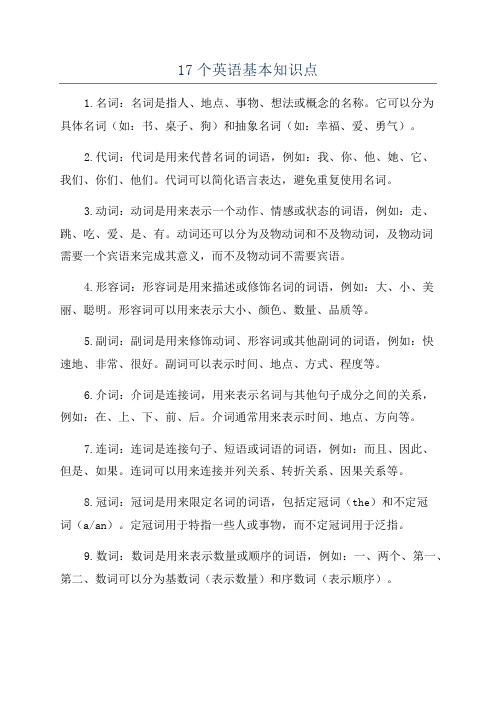
17个英语基本知识点1.名词:名词是指人、地点、事物、想法或概念的名称。
它可以分为具体名词(如:书、桌子、狗)和抽象名词(如:幸福、爱、勇气)。
2.代词:代词是用来代替名词的词语,例如:我、你、他、她、它、我们、你们、他们。
代词可以简化语言表达,避免重复使用名词。
3.动词:动词是用来表示一个动作、情感或状态的词语,例如:走、跳、吃、爱、是、有。
动词还可以分为及物动词和不及物动词,及物动词需要一个宾语来完成其意义,而不及物动词不需要宾语。
4.形容词:形容词是用来描述或修饰名词的词语,例如:大、小、美丽、聪明。
形容词可以用来表示大小、颜色、数量、品质等。
5.副词:副词是用来修饰动词、形容词或其他副词的词语,例如:快速地、非常、很好。
副词可以表示时间、地点、方式、程度等。
6.介词:介词是连接词,用来表示名词与其他句子成分之间的关系,例如:在、上、下、前、后。
介词通常用来表示时间、地点、方向等。
7.连词:连词是连接句子、短语或词语的词语,例如:而且、因此、但是、如果。
连词可以用来连接并列关系、转折关系、因果关系等。
8.冠词:冠词是用来限定名词的词语,包括定冠词(the)和不定冠词(a/an)。
定冠词用于特指一些人或事物,而不定冠词用于泛指。
9.数词:数词是用来表示数量或顺序的词语,例如:一、两个、第一、第二、数词可以分为基数词(表示数量)和序数词(表示顺序)。
10.比较级与最高级:比较级和最高级是形容词和副词的两种比较形式。
比较级用于两个人或事物的比较,最高级用于三个或三个以上的人或事物的比较。
11.时态:时态表示动作发生的时间,包括一般现在时、一般过去时、一般将来时等。
时态还可以分为进行时、完成时、将来完成时等。
12.句子结构:句子由主语、谓语和宾语等主要成分构成。
句子的结构可以是简单句(只包含一个主语和谓语)、复合句(包含两个或多个句子)或并列句(由两个或多个并列的句子组成)。
13.从句:从句是句子中的一个部分,包括主语从句、宾语从句、定语从句和状语从句等。
17个英语基本知识点

17个英语基本知识点,赶紧收藏吧。
's right./ That‘s all right./ All right.That’s right意为“对的”,表示赞同对方的意见、看法或行为,肯定对方的答案或判断。
例如:"I think we must help the old man.""我想我们应该帮助这位老人。
" "That's right."或"You're right.""说得对"。
That’s all right.意为“不用谢”、“没关系”,用来回答对方的致谢或道歉。
例如:"Many thanks." "That's all right.""Sorry. It's broken." "That's all right."All right.意为“行了”、“可以”,表示同意对方的建议或要求。
有时还可以表示“身体很好”"Please tell me about it." "请把此事告诉我。
""All right.""好吧。
"Is your mother all right你妈身体好吗2. make/do这两个词都可以解释为“做”,但含义却不同,不能混用。
make指做东西或制东西,do指做一件具体的事。
Can you make a paper boat for me 你能为我做个纸船吗He’s doing his homework now.他正在做他的作业。
3. say/speak/talk/tellsay:是最口语化的最普通的一个词,意为“说出”、“说道”,着重所说的话。
如:“I want to go there by bus” , he said . 他说,“我要坐汽车到那里去。
英语知识点

To do sth:1.want to do sth(想要做某事)2.decide to do sth(决定做某事)3.ask sb to do sth(要求某人做某事)4.promise sb to do sth(答应某人做某事)5.tell sb not to do sth(告诉某人不要做某事)6.tell sb how to do sth(告诉某人怎样做某事)e here to do sth(来这儿做某事)8.be glad to do sth(高兴做某事)9.begin to do sth(开始做某事)10.help sb to do sth(帮助某人做某事)11.be ready to do sth(准备做某事)12.It's time to do sth(该~时间了)13.stop to do sth(停止做某事)14.try to do sth(尽力做某事)Do sth:1.want do sth(想要做某事)2.see sb do sth(看见某人做某事)3.hear sb do sth(听到某人做某事)4.let sb do sth(让某人做某事)5.let sb not do sth(让某人不要做某事)6.had better do sth(最好做某事)其他:1.give sb sth=give sth to sb(给某人某物)2.be busy doing sth(忙于做某事)3.send sb sth=send sth to sb(送给某人某物)4.go to a place to do sth(去某个地方做某事)5.like to do sth=like doing sth(喜欢做某事)6.make sth for sb(为某人做某事)7.halp sb with sth(在某方面帮助某人)8.keep sth(保留某物)9.hand sth to sb(把某物递给某人)10.hand in sth to sb(上交某人某物)11.show sb sth(向某人展示某事)12.pass sth to sb(把某物递给某人)13.put sth under the tree(把某物放在树上)14.stop sth(停止某事)15.stop to do sth(停下来再做某事)16.wait for sth(等某人或物)17.finish sth=finish doing sth(完成某事)e out with sth(拿着某物出来)二.介词 + 名词形式 `第一组by accident 偶然on account of 因为,由于in addition 另外in addition to 除……之外in the air 在流行中,在传播中on (the/an) average 平均,一般来说on the basis of 根据,在……的基础上at (the) best 充其量,至多for the better 好转,改善on board 在船 ( 车、飞机 ) 上out of breath 喘不过气来on business 因公,因事in any case 无论如何,总之in case of 假使,万一in case 假如,以防 ( 万一 ) 免得in no case 决不第二组by chance 偶然,碰巧in charge (of) 负责,主管(a) round the clock 昼夜不停地in common 共用,共有,共同in conclusion 最后,总之on condition that 在……条件下in confidence 信任in connection with/to 关于in consequence 因此,结果in consequence of 由于……的缘故on the contrary 反之,正相反in contrast with/to 与……成对照out of control 失去控制under control 被控制住at all costs 不惜任何代价at the cost of 以……为代价第三组in the course of 在……过程中,在……期间of course 当然,自然,无疑in danger 在危险中,垂危out of danger 脱离危险out of date 过期 ( 时 ) 的up to date 时新的in debt 欠债in detail 详细地in difficulties 处境困难in the distance 在远处off duty 下班on duty 值班,上班on earth 究竟,到底at all events 无论如何in any event 无论如何in effect 有效;实际上第四组in the event of 万一,如果发生for example 例如with the exception of 除……之外in the face of 面对,不顾,即使in fact 其实,实际上on fire 烧着on foot 步行in force 有效;实施中in favo(u)r of 有利于,赞成,支持 in front of 在……面前in (the) future 今后,将来on guard 警惕,防范in general 通常,大体上in half 成两半at hand 在手边,在附近from tip to toe 彻头彻尾,完全by hand 用手 hand down to 往下传,传给 ( 后代 )第五组hand in hand 手拉手,携手in hand 在掌握中,在控制中on hand 在手边,临近on (the) one hand... 一方面……,on the other hand... 另一方面……at heart 在内心;实质上by heart 牢记,凭记忆at home 在家,在国内;自在,自如in honor of 以纪念,向……表示敬意on one's honor 以名誉担保in a hurry 匆忙地,立即for instance 例如,举例说at intervals 不时,时时at last 最终,终于at least 至少,最低限度in the least 一点,丝毫第六组at length 终于,最后;详细地in the light of 按照,根据in line 成一直线,排成一行in line with 与……一致,按照at a loss 困惑,不知所措as a matter of fact 其实,事实上by all means 无论如何,必定 by means of 借助于,用by no means 决不in memory of 纪念at the mercy of 在……支配下by mistake 错误地at the moment 现在,此刻for a moment 片刻,一会儿for the moment 现在,暂时in a moment 立刻,马上第七组in nature 本质上 on occasion 有时,不时in order 秩序井然,整齐in group to 以便,为了in group that 以便out of order 发生故障,失调on one's own 独自地,独立地in particular 特别地,尤其,详细地in the past 在过去,以往in person 亲自in place 在适当的位置in place of 代替in the first place 起初,首先in the last place 最后out of place 不得其所的,不适当的on the point 即将……的时候第八组to the point 切中要害,切题in practice 在实际中,实际上out of practice 久不练习,荒疏at present 目前,现在for the present 目前,暂时in proportion to( 与……) 成比例的in public 公开地,当众for (the) purpose of 为了on purpose 故意,有意with the purpose of 为了in question 正在考虑at random 随意地,任意地at any rate 无论如何,至少by reason of 由于as regards 关于,至于with/in regard to 对于,就……而论第九组in/with relation to 关系到with respect to 关于as a result 结果,因此as a result of 由于……的结果in return 作为报答,作为回报on the road 在旅途中as a rule 规章,规则;通常,照例in the long run 最终,从长远观点看for the sake of 为了……起见on sale 出售;贱卖on a large scale 大规模地on a small scale 小规模地in secret 秘密地,私下地in a sense 从某种意义上说in shape 处于良好状态on the side 作为兼职,额外第十组at first sight 乍一看,初看起来in sight 被看到,在望out of sight 看不见,在视野之外in spite of 不管,不顾;尽管,虽然on the spot 当场,在现场in step 同步,合拍out of step 步调不一致,不协调in stock 现有,备有in sum 总而言之in tears 流着泪,含泪,哭in terms of 依据,按照;用……措词for one thing 首先,一则on the second thoughts 经重新考虑,一转念at a time 每次,一次at no time 从不,决不at one time 同时,曾经,从前曾第十一组at the same time 但是,然而at times 有时for the time being 目前,暂时from time to time 有时,不时in no time 立即,马上in time 及时,适时地on time 准时on top of 在……之上out of touch 失去联系in truth 事实上,实际上,的确on try 试穿by turns 轮流,交替地in turn 依次,轮流in vain 徒劳,无效a variety of 种种,各种by virtue of 由于第十二组by the way 顺便提一下,另外by way of 经由,通过……方式in a way 在某点,在某种程度上in no way 决不in the way of 妨碍in one's/the way 妨碍,阻碍after a while 过了一会,不久for a while 暂时,一时on the whole 总的来说in a word 总而言之in other words 换句话说,也就是说at work 在工作,忙于out of work 失业in the world 到底,究竟动词 + 名词形式第十三组have/gain access to 可以获得take...into account 考虑gain/have an advantage over 胜过,优于pay the way for 为……铺平道路take advantage of 利用,趁……之机pay attention to 注意do/try one's best 尽力,努力get the best of 胜过make the best of 充分利用,妥善处理get the better of 打败,致胜catch one's breath 屏息,歇口气take care 小心,当心take care of 照顾,照料take a chance 冒险一试take charge of 担任,负责keep company with 与……交往,与……take delight in 以……为乐with delight 欣然,乐意地第十四组make a/the difference 有影响,很重要carry/bring into effect 使生效,使起作用put into effect 实行,生效come/go into effect 生效,实施take effect 生效,起作用catch one's eye 引人注目keep an eye on 留意,照看make a face 做鬼脸find fault 埋怨,挑剔catch fire 着火come/go into force 生效,实施make friends 交朋友,友好相处be friends with 对……友好,与……交上朋友make fun of 取笑,嘲弄keep one's head 保持镇静lost one's head 不知所措第十五组lose heart 丧失勇气,失去信心get/learn by heart 记住,背诵get hold of 抓住,掌握keep house 管理家务,做家务throw/cast light on 使明白,阐明bear/keep in mind 记住have in mind 记住,考虑到,想到make up one's mind 下决心come/go into operation 使投入生产,使运转put in order 整理,检修keep/hold pace with 跟上,与……同步play a part 起作用take place 发生,进行take the place of 代替come to the point 说到要点,扼要地说bring/carry into practice 实施,实行第十六组make progress 进步,进展give rise to 引起,使发生make sense 讲得通,有意义catch the sight of 发现,突然看见(go) on the stage 当演员take one's time 不急不忙,从容进行keep in touch 保持联系keep track 通晓事态,注意动向lose track 失去联系make use of 利用put to use 使用,利用give way 让路,让步lead the way 带路,引路make one's way 前进,进行make way 让路,开路keep one's word 遵守诺言第十七组act on 作用appeal to 呼吁,要求attempt at 企图,努力attitude to/towards 态度,看法a great/good deal of 大量 ( 的 ) ,许多 ( 的 ) influence on 影响interference in 干涉interference with 妨碍,打扰第十八组introduce to 介绍a lot (of) 许多 ( 的 ) ,大量 ( 的 )lots of 大量,很多fall in love with 相爱,爱上a matter of( 关于……) 的问题a number of 若干,许多reply to 回答,答复a series of 一系列,一连串英语常考词语固定搭配(四)第十九组trolley bus 电车I. D. card 身份证credit card 信用卡no doubt 无疑,必定next door 隔壁out of doors 在户外face to face 面对面地as matter of fact 实际情况,真相a few 有些,几个quite a few 还不少,有相当数目的a little 一点,稍微,一些,少许little by little 逐渐地quite a little 相当多,不少no matter 无论the moment (that) 一……就no more 不再第二十组fair play 公平竞赛;公平对待in demand 有需要,销路好rest room 厕所,盥洗室primary school 小学side by side 肩并肩,一个挨一个heart and soul 全心全意step by step 逐步ahead of time 提前all the time 一直,始终once upon a time 从前once in a while 偶尔,有时no wonder 难怪,怪不得word for word 逐字地decline with thanks 婉言谢绝动词 + 介词形式第二十一组account for 说明 ( 原因等 )aim at 瞄准,针对allow for 考虑到appeal to 呼吁,要求arrive at 达成,得出ask after 询问,问候ask for 请求,要求attach to 附属于,隶属于begin with 从开始break into 闯入break off 断绝,结束break through 突破break up 中止,结束;打碎,折断bring about 带来,造成bring down 打倒,挫伤;降低bring forth 产生,提上第二十二组bring forward 提出bring out 使出现;公布;出版bring up 教育,培养,使成长build up 积累;堵塞;树立,逐步建立;增进;锻炼call for 邀请;要求;需求call forth 唤起,引起;振作起,鼓起call off 放弃,取消catch at 抓住 ( 东西 )call on/upon 访问,拜访;号召,呼吁call up 召集,动员;打电话care for 照管,关心;喜欢,意欲carry off 夺去carry on 继续下去;从事,经营carry out 贯彻,执行;实现come to 总计,达到;苏醒,复原count on 依靠;期待,指望count up 把……相加第二十三组cover up 掩饰,掩盖cut across 走捷径,抄近路deal with 处理,对付,安排do without 没有……也行fill in/out 填充,填写get at 得到,接近;意思是get into 进入,陷入go after 追求go into 进入;研究,调查go for 竭力想取得;喜爱;支持,拥护go through 经历,经受;详细检查go with 伴随,与……协调go without 没有……也行improve on 改进keep to 保持,坚持lie in 在于live up to 不辜负第二十四组live on/by 靠……生活,以……为食live through 度过,经受过look after 照管,照料look at 看望,注视look for 寻找,寻求look into 调查,观察,过问;窥视look over 检查,查看,调查look through 仔细查看,浏览,温习make for 走向,驶向;有助于occur to 被想到,被想起play with 以……为消遣,玩弄refer to 参考,查阅,涉及,提到run for 竞选run into 撞上,偶然碰见see to 注意,负责,照料,修理send for 派人去请,召唤;索取第二十五组send in 呈报,递交,送来serve as 作为,用作set aside 挑出,拨出,留出;拒绝sit for 参加stand by 支持,帮助;袖手旁观stand for 代替,代表,意味着stand against 反抗,抵抗stick to 坚持,忠于,信守take after 与……相像take for 把……认为是,把……看成是take in 接受,吸收;了解,理解take to 喜欢,亲近touch on 关系到,涉及turn into 变成turn to 变成;求助于,借助于turn off 关上;出产;解雇动词 + 副词形式第二十六组break down 损坏,分解,瓦解break in 闯入;打断,插嘴break out 逃出;突然发生,爆发bring to 使恢复知觉burn out 烧掉burn up 烧起来,旺起来;烧完catch on 理解,明白check in 办理登记手续check out 结账后离开;检验,核查check up (on) 校对,检查,检验cheer up 使高兴,使振奋clear away 扫除,收拾clear up 收拾;澄清;放晴make it clear that 弄清楚come off 实现,成功,奏效come on 请,来吧,快点;开始,出场,上演come out 出版;出现,显露;结果是第二十七组come round (around) 来访,前来;苏醒,复原come through 经历,脱险come up 走近,上来;发生,被提出cross out 删去,取消cut back 削减,减少cut down 削减,降低cut in( 汽车 ) 抢道;插嘴,打断cut off 切断;删去;停止cut out 删除cut short 突然停止die down 渐渐消失,平息die out 消失,灭绝draw in( 火车、汽车 ) 到站draw up 写上,画上;草拟;停住dress up 穿上盛装,打扮得很漂亮drop by/in 顺便来访dry out 干透,使干dry up 干涸,枯竭第二十八组drop off 减弱,减少drop out 退出,离队fall behind 落后fall out 争吵;结果是fall through 落空,失败feed in 输入find out 查明get across 解释清楚,使人了解get around/round 走动,旅行; ( 消息 ) 传开get away 逃脱,离开get by 通过,经过get down 从……下来;写下get in 进入;收获,收集get off 从……下来;离开,动身,开始get over 克服; ( 从病中 ) 恢复过来get through 结束,完成;接通电话have got to (do) 不得不,必须第二十九组get together 集合,聚集get up 起床;增加,增强give away 泄露;分送give back 送还,恢复give in 交上;投降,屈服give off 放出,释放give out 分发,放出give up 停止,放弃go ahead 开始,前进;领先go by 过去go down 下降,降低;被载入,传下去go off 爆炸,发射;动身,离开go out 外出;熄灭go over 检查,审查;复习,重温go round/around 足够分配go under 下沉,沉没;失败;破产go through 通过,审查,完成第三十组go up 上升,增加;建起hand down 流传下来,传给,往下传hand in 交上,递交hand on 传下来,依次传递hand out 分发,散发,发给hand over 交出,移交,让与hang about 闲荡,徘徊,逗留hang back 犹豫,踌躇,畏缩hang on 抓紧不放;继续下去hang up 挂断 ( 电话 )have back 要回,收回have on 穿着,戴着hold back 踌躇,退缩;阻止,抑制hold on 继续,握住不放hold out 维持,支持;坚持,不屈服hold up 举起,阻挡,使停止;抢劫第三十一组hurry up( 使 ) 赶快,迅速完成keep back 阻止,阻挡;隐瞒,保留keep down 控制,压制,镇压;压低keep off 不接近,避开keep up 保持,维持;继续,坚持let down 放下,降低;使失望let in 让……进入,放……进来let off 放 ( 烟,烟火 ) ,开 ( 枪 ) let out 放掉,放出,发出line up 排队,使排成一行look back 回顾,回头看look out 留神,注意,提防,警惕look on 旁观,观看;看待,视作look up 查阅,查考;寻找 ( 某人 ) look in 顺便看望make out 辨认,区分;理解,了解make out of 用……做,从……得出第三十二组make up 构成,拼凑;弥补,赔偿;化装mix up 混淆,混合,搞糊涂pass away 去世,逝世pass off 中止,停止pass to 转到,讨论,传到pass out 失去知觉,昏倒pay back 偿还,回报pay off 还清 ( 债 )pay down 即时交付,用现金支付pay up 全部付清第三十三组pick out 选出,挑出,拣出;辨认,辨别出pick up 拾起, ( 偶然 ) 得到; ( 车船 ) 中途搭 ( 人 ) ,学会pull down 拆毁,拉倒;拉下,降低pull in( 车 ) 停下,进站,船 ( 到岸 )pull off 脱 ( 帽、衣 )pull on 穿,戴pull out 拔出,抽出; ( 车、船 ) 驶出pull together 齐心协力pull up( 使 ) 停下put across 解释清楚,说明put aside 储存,保留put away 放好,收好;储存put down 记下,放下;镇压,平定put forward 提出put in 驶进put on 穿上,戴上;上演;增加 ( 体重 )put out 熄灭,关 ( 灯 ) ;出版,发布;生产put right 改正 ( 错误 ) ,整理第三十四组put up 提起,举起,提 ( 价 ) ;为……提供食宿,投宿ring off 挂断电话rub out 擦掉,拭去run down 撞倒,撞沉;追捕,追查run off 复印,打印run over 略读,略述;辗过,浏览,匆匆复习see off 给……送行see through 看穿,识破;干完,干到底set back 推迟,延缓,阻碍set down 卸下,放下,记下,记入set forth 阐明,陈述set off 出发,动身;引起,使发生set out 陈列,显示;动身,起程;制定set up 创立,建立,树立;资助,扶持show in 领入show off 炫耀,卖弄第三十五组show up 使呈现,使醒目shut out 排除sit in 列席,旁听sit up 迟睡,熬夜speed up 使加速stand out 突出,显眼stand up 站起来,耐用step up 提高,加快,加紧step in 插入,介入stick out 伸出,突出;坚持到底,继续take away 消除;消耗take down 记下,写下take off 拿走,脱下;起飞take on 呈现;接纳,承担,从事take over 接管,接办take up 占据;开始;拿起,接收take up with 和……交往,忍受,采用最佳答案最新高考动词短语汇总l.动词+aboutspeak/talk about 谈论 think about 思考care about 关心,对……有兴趣 bring about 引起,使发生 set about 着手,开始 come about 发生hear about 听说 worry about 为……担心2.动词+awaythrow away 扔掉 blow away 吹走carry away 拿走,使入迷 clear away 清除掉,消散die away 逐渐消失,减弱 pass away 去世wash away 冲走 take away 拿走,使消失put away 收拾起来,存起来 give away 背弃,泄漏,赠送 wear away 磨掉,消耗 break away 摆脱send away 让走开 turn away 把……打发走3.动词+backkeep back 隐瞒,忍住 look back(on) 回顾hold back 控制住 give back 归还call back 回电话 take back 拿回,收回4.动词+forrun for 竞选 ask for 要求得到wait for 等候 stand for 代表,表示long for 渴望 hope/wish for 希望得到care for 关心,喜欢 beg for 乞求search for 查找 look for 寻找call for 需要,要求 hunt for 寻找change…for 用……换 charge…for 收费,要价apply for 申请 take…for 误以为……是 seek for 寻找 come for 来拿,来取5.动词+downburn down 烧毁 break down 坏了,垮了,分解take down 记下,记录 turn down 调小,拒绝cut down 削减,砍倒 slow down 慢下来pass down 传下来 put down 记下,写下,镇压calm down 平静下来 bring down 使……降低,使倒下settle down 安家 come down 下落,传下tear down 拆毁,拆除6.动词+atcome at 向……袭击 shout at 冲(某人)嚷嚷run at 冲向,向……攻击 work at 干……活动(研究) tear at 用力撕 look at 看,注视stare at 凝视 glare at 怒视glance at 匆匆一瞥 laugh at 嘲笑knock at 敲(门、窗等) point at 指向smile at 冲(某人)笑 strike at 向……打击aim at 向……瞄准 shoot at 向……射击wonder at 惊讶 call at 拜访(地点)7.动词+fromdiffer from 与……不同 suffer from 受……苦hear from 收到……来信 die from 因……而死keep/stop/prevent…from阻止…… learn from 向……学习result from 由于 date from 始于……时期separate…from 把……分离开8.动词+ofthink of 想到 dream of 梦到consist of 由……组成 speak of 谈到approve of 赞成 die of 死于talk of 谈到 hear of 听说complain of 抱怨 become of 发生……情况,怎么啦9.动词+offstart off 出发 set off 出发leave off 中断 show off 炫耀get off 下车 take off 脱下,起飞see off 送行 ring off 挂断电话put off 延期,推迟 come off 脱落,褪色cut off 切断,断绝 fall off 跌落,掉下keep off 避开,勿走近 go off 消失;坏了,爆炸,不喜欢 knock…off 把……撞落 break off 打断pay off 还清 carry off 携走带走,赢得get off 脱下(衣服等) give off 散发出turn(switch) off 关掉10.动词+ondepend on 依靠 rely on 依靠insist on 坚持 carry on 继续,进行keep/go on 继续 spend…on 在……花钱put on 穿上,戴上,上演 call on 拜访move on 继续移动,往前走 live on 以……为生feed on 以……为生 bring on 使……发展take on 雇用,呈现(新面貌等) try on 试穿have on 穿着 pass on 传授,传递look on 旁观 turn(switch) on 打开11.动词+outbreak out 爆发 point out 指出pick out 选出 figure out 算出,理解burst out 进发 bring out 阐明,使表现出carry out 执行,进行 help out 救助hold out 坚持下去 set out 出发,着手,摆放wear out 穿破,使……疲劳 turn out 结果是,生产,培养make out 理解,看清楚 come out 出版,出来cross out 划掉 leave out 省略,删掉keep out(of) 使不进入,挡住 work out 算出,想出办法等find out 查出,弄明白 give out 散发,分发,用完try out 试用,试验 look out 当心,提防put out 扑灭 speak out 大胆讲出hand out 散发 send out 发出,派遣run out 用完 go out 熄灭let out 泄漏,发出(声音),出租 die out 灭绝12.动词十ingive in 让步 hand in 上交bring in 引进,使得到收入 drop in 拜访result in 导致 succeed in 在……获成功join in 参加 take in 接纳,吸收,改小get in 收获,进入 break in 强制进入,插话fill in 填写 call in 召集,来访cut in 插入 persist in 坚持look in 来访,参观13.动词十intolook into 研究,调查 turn into 变成burst into 闯入,进发 divide…into 把……分成change…into 把……变成 put/translate…into 把……译成 run into碰到 send sb to/into sleep 使进入状态14.动词+overturn over 翻倒,细想 think over 仔细考虑go over 审阅,检查,研究 look over 翻阅,检查get over 克服 run over 压死,看一遍take over 接管,接替 watch over 看守,照看fall over 跌倒,摔倒 roll over 翻滚15.动词十tobelong to 属于 object to 反对refer to 谈到,涉及,参阅 point to 指向turn to 向……求助,查阅 stick/hold/keep to 坚持,忠于see to 处理,料理 come to 共计,苏醒reply to 答复 get to 到达bring to 使苏醒把……比作 compare…to 与…相比;把…比作agree to 同意 write to 写信给supply…to 为……提供 lead to 导致,通向add to 增添 attend to 处理,专心,照料devote…to 贡献给16.动词+upgrow up 成长,长大 give up 放弃,献出build up 建立 set up 架起、建立put up 搭起,架起,安装,住宿,张贴,盖起 do up 整理,包装,打扮go up 增长,上涨get up 起床,站起 pick up 拾起,学会,用车,来接,收听到 bring up 抚养,呕吐,提出出现 turn up 开大(音量等),出席stay up 挺住,熬夜 take up 开始学,从事,占据sit up 熬夜 eat up 吃完use up 用完 tear up 撕碎lay up 储存 make up构成,组成编造弥补cut up 切碎 join up 联结起来,参军end up 总结 come up 上来,长出,出现speed up 加快速度 throw up 呕吐clear up 整理,收拾,放晴 look up 查找,找出burn up 烧毁 catch up 赶上hurry up 赶快 fix up 修理,安排,装置keep up 保持 hold up 耽搁,使停顿send up 发射 ring up 打电话open up 开创,开辟 divide up 分配break up 分解17.动词十throughget through 通过,干完,接通电话look through 翻阅,看一遍,仔细查看go through 审阅,检查,学习put…through 接通电话 see through 识破check through 核对 pull through 渡过危机,康复18.动词+withdeal with 处理,对付 do with 处理,需要meet with 遇到,遭受 talk with 同……交谈agree with 同意,与……一致 compare with 与……相比combine with 与……相联合 equip…with 以……装备cover…with 用……覆盖 begin with 以……开始end up with 以……结束 supply…with 以……供给provide…with 以……供给 play with 玩,玩弄19.三词以上的短语动词add up to 总计 break away from 摆脱keep away from 避开,别靠近 do away with 废除look down on 轻视 look up to 仰望,尊敬put up with 忍受 catch up with 赶上keep up with 赶上 run out of 用完make up for 弥补 go on with 继续get on(along) with 和……相处 look forward to 盼望get close to 接近 take hold of 握住get out of 逃避,避免 get down to 认真开始set fire to 放火烧 pay attention to 注意take notice of 注意 set an example to 为……榜样 do well in 在……干得好 pay a visit to 访问take a photo of 拍……照片 take the place of 取代。
高中英语单词短语基础知识点
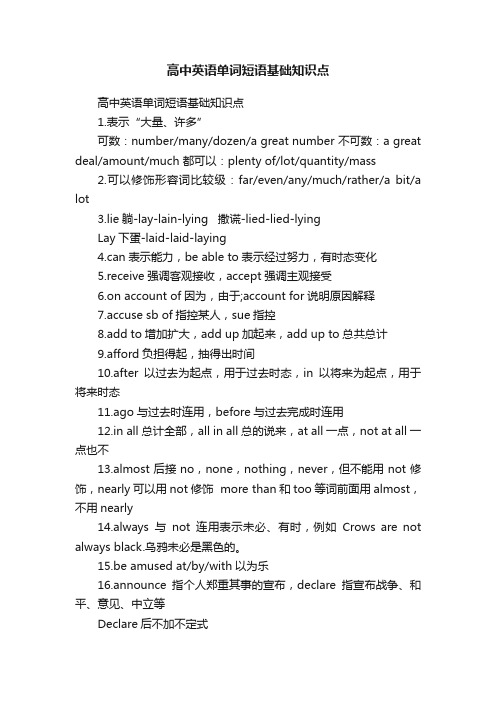
高中英语单词短语基础知识点高中英语单词短语基础知识点1.表示“大量、许多”可数:number/many/dozen/a great number 不可数:a great deal/amount/much 都可以:plenty of/lot/quantity/mass2.可以修饰形容词比较级:far/even/any/much/rather/a bit/a lot3.lie躺-lay-lain-lying 撒谎-lied-lied-lyingLay下蛋-laid-laid-laying4.can表示能力,be able to表示经过努力,有时态变化5.receive强调客观接收,accept强调主观接受6.on account of因为,由于;account for说明原因解释7.accuse sb of指控某人,sue指控8.add to增加扩大,add up加起来,add up to总共总计9.afford负担得起,抽得出时间10.after以过去为起点,用于过去时态,in以将来为起点,用于将来时态11.ago与过去时连用,before与过去完成时连用12.in all总计全部,all in all总的说来,at all一点,not at all一点也不13.almost后接no,none,nothing,never,但不能用not修饰,nearly可以用not修饰 more than和too等词前面用almost,不用nearly14.always与not连用表示未必、有时,例如Crows are not always black.乌鸦未必是黑色的。
15.be amused at/by/with以为乐16.announce指个人郑重其事的宣布,declare指宣布战争、和平、意见、中立等Declare后不加不定式17.表示渴望:long for/be anxious for/in anxiety of/have an appetite for/be eagerto do/hunger for/sick for;为某事担忧be anxious about18.anyone等于anybody,指人不指物,用于主语时谓语动词用单数,用于否定句和条件句any one既可指人,也可指物,指人时常与of连用19.apart from除之外,具有besides(处之外,还)和except两重意思20.apply to应用运用,apply for申请,apply one’s mind to 专心于21.approve of赞成同意22.arm in arm臂挽臂,hand in hand手拉手,shoulder to shoulder/side by side肩并肩23.arrive in加大地方,arrive at加小地方24.as的用法:as引导让步状语从句翻译为尽管,必须用倒装:Child as he is,as with像一样,as for sb/sth至于,as to sth至于,as it is照现状 as 表示一边一边(两个动作同时进行),asas像,如同 for表示补充说明原因25.asleep可以用fast或sound修饰,表示快速入睡和酣畅地睡26.表达日期和时间:表示某一时刻用on,表示年、月、上下午用in,表示哪一天的上下午用on,例如on Sunday morning27.attachto把固定在上28.attack前面用make,carry out等动词,后面加on表示发起攻击的对象29.表示参加的几个动词:attend指参加会议、婚礼、聚会、演讲,take part in和join都指群众性的.活动、会议、讨论等30.close attention表示密切注意31.go away走开,run away跑开,away with让消失吧32.back and forth反复来回33.badly 表示很、非常与匮乏、需要等连用,badly off贫穷、境况不好,well off富裕34.be in the balance悬而未决,on balance总的来说,hold the balance举足轻重35.bargain讨价还价、廉价货、成交的商品36.basis指抽象的基础,foundation常用复数,指建筑物的根基,也指根据、依据,ground 指某物的地面基础,也指理由、原因、立场、观点37.become是短暂性动词,不和不定式连用,become of表示发生、结果,主语只能是what,多用于完成时和将来时38.before的用法:before常用有三个意思:才,在之前,宁可、宁愿before long不久以后,用于各种时态,long before很久以前,用于过去完成时39.beg后加不定式或从句,从句用虚拟语气should+动词原形40.believe sth of sb相信某人能干出某事,believe in信任、信仰believe强调相信某人说的话,trust强调对人的品质的信任41.all the best一切顺利,make the best of尽力而为42.no better than几乎等于(都不好),not better than并不比好(一个好,一个不好) better 要用much、even、far来修饰,不能用more来修饰43.a bit有一点、一会,不直接修饰名词,a bit of修饰不可数名词,bit by bit逐渐的not a bit=not at all一点也不,not a little=very much44.blame/scold sb for sth因某事责备某人45.bleed sb dry榨取某人所有的钱46.body and soul全心全意,body信的正文47.to the bone影响深刻的,极强的48.hold one’s breath屏住呼吸,憋住气 out of breath上气不接下气take sb’s breath away令人惊叹breath要表示呼出可以加out,要表示吸入可以加in49.broad强调幅度的宽广和人的肩背宽,wide强调距离宽和伤口宽50.burn表示燃烧时,用主动表被动51.bury oneself in doing sth专心做某事52.by and by不久,很快,by和till同为“到为止”,但by加某事做完的时限,till加继续的时限by加交通工具、重量、长度、时间不加the,但加the:by the hour/meter/dozen53.go camping野营,camp out露宿54.I don’t care我不放在心上,我不在乎,后面接不定式为:我不肯,我不愿意eg:I don’t care I go.我不愿意去55.in any case无论如何,in case以防,in case of如果,假使,in that case既然那样56.原因和结果:cause和effect相对,reason和conclusion相对57.be certain to do肯定会做某事be certain of doing觉得肯定会做某事。
初一英语知识点

Unit 1 Can you play the guitar?1.下象棋 play chess2.说英语 speak English3.拉小提琴 play the violin4.弹钢琴 play the piano5.敲架子鼓 play the drums6.打篮球/网球/排球play basketball/tennis/ volleyball7.加入运动俱乐部 join the sports club8.你想加入游泳俱乐部吗? Do you want to join the swimming club?9.Tom想加入什么俱乐部? What club does Tom want to join?10.我哥哥会画画,但他画得不好。
My brother can draw,but he can't draw well11.那个女孩不会唱歌,跳舞。
The girl can’ t sing or dance.12她也喜欢踢足球。
She likes playing soccer,too/ She also likes playing soccer.13.把12变成否定: She doesn't like playing soccer,either.14.擅长讲故事 be good at telling stories15.加入讲故事俱乐部 join the story telling club16为孩子们写故事 write stories for children17.打功夫 do kung fu18.喜欢和人们说话,做游戏 like to talk and play games with people/like talking and playing games with people19.忙于作业 be busy with homework/ be busy doing homework20.有空 be free/ have time21.在敬老院工作 work at the old people' s home22.在七月 in July23.对老人有办法 be good with old people24.与说英语的学生交朋友 make friends with English- speaking students25.给我们打689-729这个电话. Call us at 689-729.26.在周末 on the weekend/ on weekends27.教他们英语 teach them English28.弹好吉他不难 It's not difficult to play the guitar wellUnit2 What time do you go to school?1.早起 get up early2.穿衣服 get dressed3.在早晨刷牙 brush teeth in the morning4.快速吃早 eat breakfast quickly/ eat a quick breakfast5.在晚上淋浴 take a shower at night6.有一份有趣的工作 have an interesting job7.在广播电台工作 work at a radio station8.从3点到5点锻炼 exercise from3 o'clock to4 o'clock9.去上班go to work10.上学迟到 be late for school11在上学的日子里on school days12.在周末 on the weekend/ on weekends13.在7:30 at half past seven14.在 12: 15 at a quarter past twelve15.在 9: 45 at a quarter to ten.16.擅长跑步 be good at running17.到家 get home18.帮父母打扫我们的房间 help parents(to)clean our room19.散步 take a walk20.做运动 play sports21大半小时排球play volleyball for half an hour22.要么...要么... either..Or...23.做作业do(one’s) homework24.不健康的习惯 unhealthy habit.25.午饭后 after lunch26.尝起来美味 taste delicious2.对于我们来说,吃大量的蔬菜是有好处的。
初一上册英语知识点总结归纳

初一上册英语知识点总结归纳Unit 11、Good morning/ afternoon / evening早上/下午/晚上好Good night 晚安(晚上辞别)2、glad / nice to meet / see you 见到你很快乐(答复也一样)3、 wele to + 地点欢送来到 (答复:Thank you 或者Thanks)4、 lets + V(原) 让我们做5、 stand up 起立sit down 坐下6、 this is ... -这是 (用于介绍第三者的用语)7、 How do you do ?你好 (答复也是:How do youdo ? )8、 How are you ? 你好吗? Fine, thank you, and you?很好;谢谢;你呢?Im OK / Im fine, too. 我也很好。
9、see you = see you later = see you soon =good-bye 再见10、excuse me打搅一下;请问11、 Im = my name is 我是12、be from = e from 来自13、in English 用英语14、Can you spell it ? Yes /No 你能拼写它吗? 能/不能15、Thats OK / Thats all right / Yourewele / Not at all不用谢16、 years old 岁17、ewtelephone number 号码 QQnumber QQ号码 ID number 身份证18、the same (一样的) 反义词是 different (不同的)例: We are in the same grade, but we are indifferent classes.句型:1. What is yourname?你的名字是什么?2. Where +be + 主语 + from? 或者Where +助动词(do/does)+主语+e from?某人来自于哪里?(答复:主语+be+地点)Where are you from? =Where do you e from?答复:I am from Zhaoqing. =I e from Zhaoqing.3. How old + be + 主语?某人几岁? (答复:主语 + be + 数字 )例: How old are you? Im fourteen (years old).4. What is your telephonenumber? 你的号码是多少?(答复:My telephone number is ... 或者Its ... )注意:读出号码的时候要逐个读出。
- 1、下载文档前请自行甄别文档内容的完整性,平台不提供额外的编辑、内容补充、找答案等附加服务。
- 2、"仅部分预览"的文档,不可在线预览部分如存在完整性等问题,可反馈申请退款(可完整预览的文档不适用该条件!)。
- 3、如文档侵犯您的权益,请联系客服反馈,我们会尽快为您处理(人工客服工作时间:9:00-18:30)。
17个英语基本知识点,赶紧收藏吧。
1.That's right./ That‘s all right./ All right. That’s right意为“对的”,表示赞同对方的意见、看法或行为,肯定对方的答案或判断。
例如:"I think we must help the old man.""我想我们应该帮助这位老人。
""That's right."或 "You're right.""说得对"。
That’s all right.意为“不用谢”、“没关系”,用来回答对方的致谢或道歉。
例如:"Many thanks." "That's all right.""Sorry. It's broken." "That's all right."All right.意为“行了”、“可以”,表示同意对方的建议或要求。
有时还可以表示“身体很好”"Please tell me about it." "请把此事告诉我。
""All right.""好吧。
"Is your mother all right?你妈身体好吗2. make/do这两个词都可以解释为“做”,但含义却不同,不能混用。
make指做东西或制东西,do指做一件具体的事。
Can you make a paper boat for me? 你能为我做个纸船吗?He’s doing his homework now.他正在做他的作业。
3. say/speak/talk/tellsay:是最口语化的最普通的一个词,意为“说出”、“说道”,着重所说的话。
如:“I want to go there by bus”, he said . 他说,“我要坐汽车到那里去。
”Please say it in English .请用英语说。
speak : “说话”,着重开口发声,不着重所说的内容,一般用作不及物动词 (即后面不能直接接宾语 ) 。
如:Can you speak about him? 你能不能说说他的情况?I don’t like to speak like this. 我不喜欢这样说话。
speak 作及物动词解时,只能和某种语言等连用,表达在对话中恰当使用词汇的能力。
如:She speaks English well.她英语说得好。
talk : 与 speak 意义相近,也着重说话的动作,而不着重所说的话,因此,一般也只用作不及物动词,不过,talk 暗示话是对某人说的,有较强的对话意味,着重指连续地和别人谈话。
如:I would like to talk to him about it . 我想跟他谈那件事。
Old women like to talk with children.老年妇女喜欢和孩子们交谈。
tell : “告诉”,除较少情况外,一般后面总接双宾语。
如:He’s telling me a story.他在给我讲故事。
tell a lie 撒谎tell sb. to do sth. /tell sb. not to do sth.Miss Zhao often tells us to study hard.4. do cooking/ do the cookingdo cooking 作“做饭”解,属泛指。
do the cooking 特指某一顿饭或某一家人的饭。
cooking为动名词,不能用作复数,但前面可用 some, much修饰。
从do some cooking可引出许多类似的短语:do some washing 洗些衣服do some shopping 买些东西do some reading 读书do some writing 写些东西do some fishing 钓鱼从以上短语可引申出另一类短语,不能用some, much 或定冠词。
go shopping 去买东西go fishing 去钓鱼go boating 去划船go swimming 去游泳5. like doing sth./ like to do sth.like doing sth. 与like to do sth. 意思相同,但用法有区别。
前者强调一般性的爱好或者表示动作的习惯性和经常性;后来表示一次性和偶然性的动作。
例如:He likes playing football, but he doesn‘t like to play football with Li Ming.他喜欢踢足球,但是他不喜欢和李明踢。
6. other/ others/ the other/ anotherother表其余的,别的,Have you any other questions?你还有其他问题吗? others 别的人,别的东西In the room some people are American, the others are French.在屋子里一些人是美国人,其他的是法国人。
the other表另一个(二者之中)one…,the other…One of my two brothers studies English, the other studies Chinese.我两个哥哥中的一个学习英文,另一个学中文。
another表三者以上的另一个,另一些There is room for another few books on the shelf.书架上还可以放点书。
7. in the tree/ on the treein the tree 与 on the tree.译成中文均为"在树上"但英语中有区别。
in the tree表示某人、某事(不属于树本身生长出的别的东西)落在树上,表示树的枝、叶、花、果等长在树上时,要使用on the tree.如:There are some apples on the tree. 那棵树上有些苹果。
There is a bird in the tree. 那棵树上有只鸟。
8. some/ any(1)some和 any既可修饰可数名词,也可修饰不可数名词。
但有以下两点需要注意。
some常用于肯定句中,any常用于否定句和疑问句中。
如:There is some water in the glass.Is there any water in the glass?There isn't any water in the glass.(2)在说话者希望得到肯定答复的一般疑问句中,或在表示请求,邀请的疑问句中,我们依然用some。
如:Would you like some tea?9. tall/ high(1)说人,动物,树木等有生命的东西,主要用tall,不用high,例如a tall woman 一个高个子妇女a tall horse 一个高大的马(2)说一个不与地面接触的人和物的高时,要用high,而不用tall,比如人站在桌子上时,飞机飞上天时,例如:He is high up in the tree. 他高高地爬在树上。
The plane is so high in the sky. 飞机在空中这么高。
(3)指建筑物、山时要tall或high都可以,不过high的程度比tall高。
(4)high可作副词,tall不能。
(5)tall的反义词为short, high的反义词为low.10. can/ could(1) can表示体力和脑力方面的能力,或根据客观条件能做某种动作的"能力"。
例如:Can you ride a bike?你会骑自行车吗?What can I do for you?要帮忙吗?Can you make a cake?你会做蛋糕吗?(2) can用在否定句和疑问句中时有时表示说话人的"怀疑""猜测"或不肯定。
例如:Where can he be?他会在什么地方呢?Can the news be true?这个消息会是真的吗?It surely can't be six o'clock already?不可能已经六点钟了吧?You can't be hungry so soon,Tom,you've just had lunch.汤姆,你不可能饿得这么快,你刚吃过午饭。
What can he mean?他会是什么意思?在日常会话中,can可代替may表示"允许",may比较正式。
例如:You can come in any time.你随时都可以来。
--- Can I use your pen?我能用你的钢笔吗?--- Of course,you can.当然可以。
You can have my seat,I'm going now.我要走了,你坐我的座位吧。
(3) couldcould 是 can的过去式,表示过去有过的能力和可能性(在否定和疑问句中)。
例如:The doctor said he could help him.(能力)医生说他能帮助他。
Lily could swim when she was four years old.(能力)当丽丽四岁的时候她就会游泳。
At that time we thought the story could be true.(可能性)那时我们以为所说的可能是真的。
could可代替can表示现在时间的动作,但语气较为婉转。
例如:Could I speak to John,please?我能和约翰说话吗?Could you?在口语中表示请求对方做事。
例如:Could you wait half an hour?请你等半个小时好吗?Could you please ring again at six?六点钟请你再打电话好吗?(4) can的形式只有现在式can和过去式could两种形式。
能表示一般现在和一般过去两种时态,有时也能表示将来。
所有其他时态(包括将来时)须用be able to加动词不定式来表示。
例如:They have not been able to come to Beijing.他们没有能到北京来。
11. look for/ findlook for 意为“寻找”,而find意为“找到,发现”,前者强调“找”这一动作,并不注重“找”的结果,而后者则强调“找”的结果。
